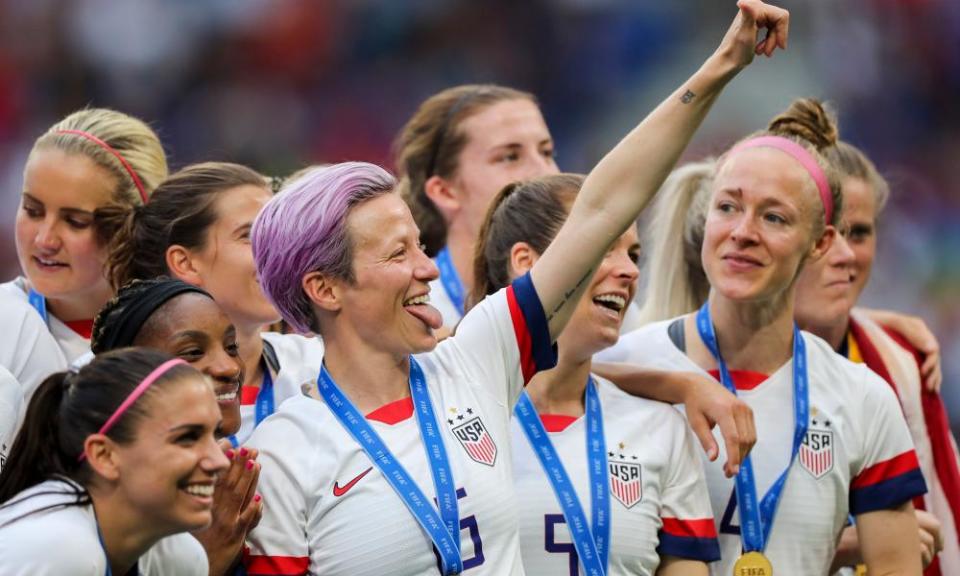'It's just the start': how World Cup victory affects USA's fight for equal pay

Just after USA sealed their fourth Women’s World Cup on Sunday a chant broke out around the Stade de Lyon: “Equal pay! Equal pay!”
It may have taken the players a while to hear what the fans were shouting, but eventually they understood. The supporters in the stadium – or the vocal ones at least – had sided with the team in the gender discrimination lawsuit that has lingered in the background of the tournament, and is now waiting for the players as they return to the US.
Winger Tobin Heath said: “It was fantastic to be able to hear the support of the fans in the stadium for something we’ve been fighting so hard for, especially on a global stage. I think it’s just the start of something massive and culture changing.”
Related: Revealed: the $730,000 gender pay gap in US World Cup bonuses
While “equal pay” has many facets – including the massive disparity in prize money that Fifa offers the winners of its men’s and women’s World Cups – there is no more pressing concern than the lawsuit the players filed against their boss, the US Soccer Federation. The players allege the federation has practiced “institutionalized gender discrimination” – and it’s not just down to pay. The players have often found themselves in inferior accommodation to the men and, unlike their male counterparts, the women’s team have had to compete on artificial turf, which leaves footballers more prone to injury.
Coming into the tournament, the players insisted the lawsuit sat on the back burner and that trying to win the World Cup was a separate goal. But they know lifting the trophy has helped their case and put pressure on their employers.
Asked how the World Cup win changes the lawsuit, Megan Rapinoe smiled. “Well, it’s not good for them, is it?” she asked rhetorically, referring to the federation.
“[Winning the World Cup] is huge,” Rapinoe added. “We’ve been shy to say that and put so much pressure on ourselves because we think we have a case no matter what. But this just blows it out of the water. Is it even about that anymore, or is it just about doing the right thing? The federation is in a unique position to ride this good wave of fortune.”
At the core of the players’ argument is that they have had to win to get paid while the men have been compensated more generously without getting close to a World Cup title. The rallying cry has been “equal pay for equal work” – but in fact the women have done more work. In a typical calendar year, they play more often than the men, to the point where the women bring in more money from games, the biggest single source of revenue for each team. That shoots a harpoon into the heart of the argument that the men should be paid more because they generate more money.
The lawsuit doesn’t hinge on USA winning the World Cup, but everything else will. The public support for the team, who are as popular now as they have ever been, will continue to surge. US Soccer is now in a fight with its most successful and beloved team, and will probably want to resolve this without going to trial.
Related: Women’s World Cup 2019: Guardian writers pick their highs and lows
“It’s always a good thing to have [the World Cup victory] in the back pocket,” says defender Becky Sauerbrunn. “But we never wanted to base our case off the success of the women’s team – we wanted it based on the merit of the work we’re putting in for the team. But yeah, it’s also helpful to have the public on your side.”
Both sides in the lawsuit have tentatively agreed to mediation, and winning the World Cup adds pressure on US Soccer to meet the players’ demands, which sources say include a payout for current and former players in the tens of millions of dollars. That sum should not be beyond the means of US Soccer, which is reportedly sitting on a surplus of $150m.
Right now,a settlement seems like the most likely outcome since truly “equal pay” may not be possible. The US national teams negotiate separate collective bargaining agreements with different pay structures, and the women are not asking for the same compensation as the men. After all, the women get salaries combined with bonuses while the men just get bonuses.
But the women argue that, in addition to substandard treatment in other ways, US Soccer offers the women less compensation overall, regardless of how it is doled out.
However, the women are now world champions, and those upcoming mediation sessions should a different tone than if the team had crashed out before the final. After all, they won on the largest stage. And with the world’s attention on the champions, the public began chanting for equal pay. That wave of support will not be lost on the lawyers dealing with this lawsuit – and it was certainly not lost on the players.
“It was freaking amazing,” goalkeeper Ashlyn Harris said of the chants. “When this is all said and done, we probably won’t remember very much from this match. But the legacy we leave behind of pushing women forward and standing up for what’s right, that is what’s important and what’s what we’re continuing.”

